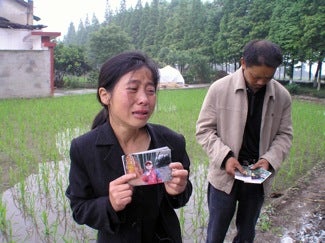The Academy’s documentary branch knows what it likes.
And in the Documentary Short category, it likes serious, issue-oriented docs that run between 35 and 40 minutes and are, more often than not, produced or distributed by HBO.
That applies to most of this year’s crop, which includes five nominees for the first time since the 2004 Oscars. (Usually, four films make the cut.) The nominees deal with serious social and political issues – and though there’s a fair amount of variety and one real change-of-pace, they fit the mold to which this category often seems to be slavishly devoted.
I have problems with this relentless focus on a single kind of documentary: the short doc nominees at the International Documentary Association’s awards gave a more varied idea of what the field is capable of, including the marvelous, haunting tone poem “Salt,” which won.
But while I wish the Oscar voters would widen their scope, that’s not to denigrate any of these nominees, most of which have a shot at winning and one of which I’d say is among the most powerful pieces of cinema in any Oscar race this year.
Unlike the animated and live-action shorts, which open in theaters on Friday and will be available on iTunes and VOD, the documentary shorts nominees will not be playing in theaters around the country. But the IDA’s annual DocuDays programs, which take place in Los Angeles and New York on the Friday and Saturday before the Oscars, will be showing all five nominees, as well as the Documentary Feature contenders.
(Information on DocuDays is available here.)
To finish our three-day roundup of all 15 shorts nominees, here are the contenders:
 “China’s Unnatural Disaster: The Tears of Sichuan Province”
“China’s Unnatural Disaster: The Tears of Sichuan Province”
Directors: Jon Alpert and Matthew O’Neill
Running time: 39 minutes
In August 2008, a 7.8 magnitude earthquake hit China’s Sichuan Province, killing 70,000 people. Of those, 10,000 were children, many of whom lost their lives when their schools collapsed, often while surrounding buildings remained standing. “Tofu construction,” critics called the schools’ shoddy workmanship.
“China’s Unnatural Disaster” examines the aftermath, as anguished parents mourn the loss of their only children and demand answers from a government that seemed to sanction the unsafe buildings and seems unwilling to accept responsibility or fully investigate the tragedy.
The short does an exceptional job of capturing the grief of the survivors – the opening five minutes, in which a young girl pays tribute to her classmates in a school where 317 children died, will break your heart – but the same thing that makes the parents inconsolable makes the film frustrating. Everything builds toward a confrontation that never comes, except in vague promises and cursory investigations. That’s not the fault of the filmmakers, who faced governmental interference and censorship in exposing the truth, but it makes this film feel like the first part of a story that is still heading towards its conclusion.
 “The Last Campaign of Governor Booth Gardner”
“The Last Campaign of Governor Booth Gardner”
Director: Daniel Junge
Producer: Henry Ansbacher
Running time: 38 minutes
A year after he left office in 1993, Booth Gardner, the popular governor of Washington state, was diagnosed with Parkinson’s Disease. In 2008, suffering from the effects of the disease, he embarked on a final political campaign in support of state Initiative 1000, the so-called “Death with Dignity” act that would allow physicians to prescribe, but not administer, lethal medication to terminally ill patients who met certain conditions.
“The Last Campaign” is partly a profile of Gardner, partly an even-handed treatment of the campaign that gives substantial time not only to Gardner’s team but to opponents of the initiative. The film doesn’t demonize the opposition or hard-sell the issue; instead, it lets the process unfold, although it’d be nice to have more information along the way as to what the polls were indicating.
As the chronicle of a campaign, the short is relatively pro-forma; its real strength is as a moving character study of a capable, intelligent man trying to make his voice heard as his body falls apart.
 “The Last Truck: Closing of a GM Plant”
“The Last Truck: Closing of a GM Plant”
Directors/writers: Steven Bognar and Julia Reichert
Running time: 40 minutes
The other 2009 film that uses interviews with laid-off workers, “Up in the Air,” may be a Best Picture nominee, but “The Last Truck” doesn’t take a back seat to any other movie when it comes to cutting to the heart of this country’s economic crisis. The story of the last days of General Motors’ largest plant as told by the people who worked there, it is a gripping, enormously sad work.
The GM plant in Moraine, Ohio was bigger than the Pentagon, with a workforce of 2,500; when the automaker announced its closing in the summer of 2008, directors Stephen Bognar and Julia Reichert began filming a cross section of union workers, many of whom had devoted decades to their jobs. The workers are tough and wise and funny and profane, their anger and hurt growing as the closing date (two days before Christmas!) approaches.
There’s nothing groundbreaking about the film’s approach, a standard mixture of talking heads and footage shot around and in the plant. But “The Last Truck” feels new and fresh and devastating. It is an essential document of these times.
 “Music by Prudence”
“Music by Prudence”
Director: Roger Ross Williams
Producer: Elinor Burkett
Running time: 35 minutes
Prudence Mabhena is a young woman from Zimbabwe, and a remarkable singer in the Afro-fusion band Linaya. She’s also confined to a wheelchair, the victim of a condition called arthrogryposis that has left her, in the words of the film’s website, “crippled and deformed.”
“Music by Prudence” does a straightforward job of telling the story of a child who was abandoned by her parents and shunned by a culture that thought disabilities were the product of witchcraft; she found a home only when she arrived at a school for children with disabilities, where she made friends and her musical talents blossomed to the point where she and her band have become celebrities of a sort.
Although it deals with the treatment of the disabled, “Music by Prudence” is ultimately a joyous film about art; while it may not have the eloquence of a previous winner, “A Note of Triumph,” it benefits from the rich, vibrant music of Linaya. Is that enough to push it to the top of many ballots? Probably not, although being the one nominee to leave viewers smiling is sometimes enough.
 “Rabbit a la Berlin”
“Rabbit a la Berlin”
Director/writer: Bartek Konopka
Producer/writer: Anna Wydra
Running time: 40 minutes
Producer Anna Wydra calls this film “a nature documentary about socialism,” which is as good a way as any to describe an intriguing, stylish work that looks and feels nothing at all like the other nominees. The story is remarkable: the building of the Berlin Wall, it seems, trapped a huge number of rabbits in the Potsdamer Platz, where they were sealed from predators by two sections of the wall. The rabbits flourished there for decades, until the dismantling of the wall forced them to adjust to the new realities of a unified Germany.
If you think that sounds like a recipe for metaphor, you’re right. When the narrator starts telling you that the rabbits “began to realize that they had been shut in for their own good,” or that they “slid into apathy” and had trouble adjusting to freedom, it’s not hard to figure out that our furry friends are supposed to represent the East German citizenry. In fact, the metaphorical weight sometimes seems like a bit too much for the poor little rabbits to bear.
The movie is arty and stylish and weird, mixing historical footage with dramatic shots of rabbits in an odd, novel way that often feels as much like fiction as documentary. If voters are looking for something different, this is it – but then, if the voters were looking for something different, they wouldn’t keep nominating the same kind of films year after year.
Bottom line: For its immediacy, timeliness and straightforward eloquence, I think “The Last Truck” is pretty undeniable in this category. Its only stumbling block could come if the two other serious entries siphon off enough votes to let the uplifting “Music by Prudence” or the novel “Rabbit a la Berlin” slip in. But I don’t see that happening.






